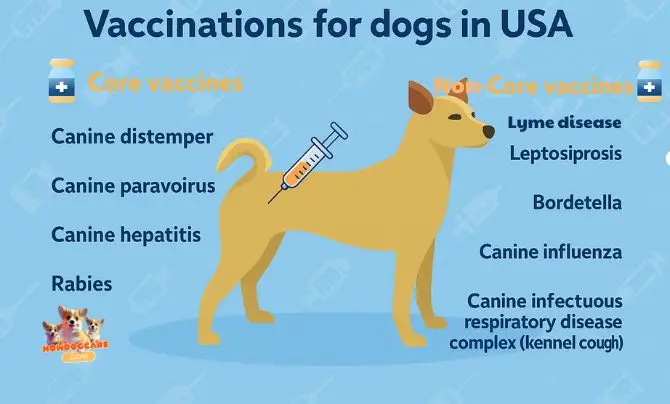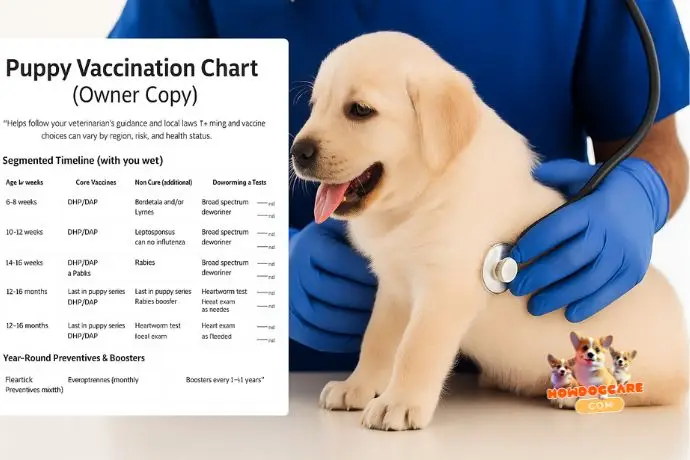Getting a puppy is exciting—but keeping them safe and healthy? That’s your #1 job as a dog parent. And it starts with vaccines. A consistent, on-time puppy vaccination schedule protects your new fur baby from dangerous diseases like parvo, distemper, and rabies—while helping them grow into a confident, adventure-ready adult.
In this guide, we’ll break down exactly when and what shots your puppy needs, which vaccines are optional, what side effects to expect, and how much it all costs. We’ve also included a printable puppy vaccine chart so you can track your pup’s progress from 6 weeks to 1 year with confidence.
Let’s keep your puppy protected—one shot at a time.
Why Puppy Vaccinations Are Critical for Health
Understanding How Puppy Immunity Develops
When puppies are born, they receive temporary antibodies from their mother’s milk (colostrum). These antibodies offer short-term protection but start to fade around 6 to 8 weeks of age. That’s when your pup becomes vulnerable—and when vaccinations must begin.
Vaccines train your puppy’s immune system to recognize and fight off viruses without making them sick. Since maternal antibodies can interfere with early vaccine effectiveness, multiple booster shots are necessary to build strong, long-lasting protection.
Common Diseases Prevented by Puppy Vaccines
Vaccines don’t just protect your pup—they protect your peace of mind. Here are the most common diseases that routine vaccinations prevent:
- Parvovirus (Parvo): Highly contagious, deadly, and common in unvaccinated puppies
- Canine Distemper: Attacks the nervous and respiratory systems; often fatal
- Adenovirus (Hepatitis): Causes liver failure, vomiting, and jaundice
- Parainfluenza: Triggers kennel cough and upper respiratory issues
- Rabies: Fatal and legally required in most states
- Leptospirosis: A bacterial disease from contaminated water; can be zoonotic
- Bordetella: Major cause of kennel cough, often required for daycare/boarding
- Lyme Disease: Spread by ticks in certain U.S. regions
🦴 Pro Tip: Core vaccines cover the most dangerous, widespread threats—your vet may recommend additional non-core vaccines based on your dog’s environment and lifestyle.
Herd Immunity and Dog Community Health
Vaccinating your puppy doesn’t just keep them safe—it protects every dog they come into contact with, especially those who are too old, sick, or young to be vaccinated. That’s called herd immunity, and it’s essential in parks, training classes, and multi-dog homes.
✅ Related Articles
- The Ultimate Free Puppy Checklist for New Dog Owners
- Top 10 Best Dog First Aid Kits (2026): Trail, Travel & Home
- How to Make Dog Food: Updated Guide & Expert Tips (2026)
Core vs. Non-Core Vaccines for Puppies

What Are Core Vaccines and Why Are They Mandatory?
Core vaccines are considered essential for all puppies regardless of breed, size, or living environment. These vaccines prevent severe, contagious, and often fatal diseases that are widespread and pose a public health risk.
🩺 Core Vaccines Include:
- DHPP (Distemper, Hepatitis, Parainfluenza, Parvovirus)
- Rabies
💡 In many regions, rabies is a legal requirement by 12–16 weeks of age. Not vaccinating could result in fines or even pet confiscation if bitten or exposed.
Optional (Non-Core) Vaccines Based on Lifestyle & Region
Non-core vaccines are recommended based on your puppy’s specific risk level. These are especially important if your pup:
- Spends time outdoors or in wooded areas (Lyme disease)
- Attends dog daycare, groomers, or training classes (Bordetella)
- Lives in areas with standing water or rodent exposure (Leptospirosis)
- Frequently travels or is boarded (Canine Influenza)
🗺️ Your vet will help you decide which of these apply based on your geography and routine.
When to Talk to Your Vet About Extra Protection
At your puppy’s first visit (around 6–8 weeks), ask your vet:
- Which non-core vaccines are recommended?
- Are there local outbreaks of leptospirosis or Lyme?
- Does your clinic offer combination shots or single doses?
- How can you minimize stress on shot days?
The right vaccine plan is personalized, and your vet is your best partner in making that decision.
Complete Puppy Vaccination Schedule (Week-by-Week)
Vaccines work best when given on a fixed timeline to build up and reinforce immunity. Here’s the vet-recommended schedule you should follow:
6–8 Weeks Old
- DHPP (1st dose)
- Fecal exam & deworming
- Physical exam
- Begin heartworm prevention (optional)
10–12 Weeks Old
- DHPP (2nd dose)
- Bordetella (if needed)
- Leptospirosis (1st dose, if applicable)
- Optional: Canine Influenza
14–16 Weeks Old
- DHPP (3rd dose)
- Leptospirosis (2nd dose)
- Lyme (if needed)
- Rabies vaccine (mandatory)
6 Months – 1 Year
- DHPP booster (1 year after last dose)
- Rabies booster
- Optional: repeat Bordetella, Lepto, or Lyme if recommended
📅 Always keep vaccine records on hand, especially for travel, boarding, or training class requirements.
Puppy Vaccination Chart (Printable)
To make tracking easy, here’s a clear and printable puppy vaccination schedule you can save, screenshot, or hang on your fridge. This chart outlines all core and optional vaccines from 6 weeks to 1 year.

Puppy Vaccination Chart (Owner Copy)
| Age Window | Core Vaccines | Non-Core (risk/region) | Deworming & Tests | Date / Lot / Initials |
|---|---|---|---|---|
| 6–8 weeks | DHPP #1 | ± Bordetella (kennel/travel) | Fecal test; deworm (per vet) | Date: ______ • Lot: ______ • Tech: ____ |
| 9–11 weeks | DHPP #2 | ± Bordetella booster (if needed) | Deworm repeat if indicated | Date: ______ • Lot: ______ • Tech: ____ |
| 12–14 weeks | DHPP #3 | ± Lepto #1 • ± Lyme #1 • ± Influenza #1 | Fecal recheck (as advised) | Date: ______ • Lot: ______ • Tech: ____ |
| 16–18 weeks | DHPP #4 (final in series) | ± Lepto #2 • ± Lyme #2 • ± Influenza #2 | Deworm per risk; discuss spay/neuter timing | Date: ______ • Lot: ______ • Tech: ____ |
| 16+ weeks (per law) | Rabies #1 | — | Microchip verify / register | Date: ______ • Lot: ______ • Tech: ____ |
| 12 months | DHPP booster (1–3 yr per vet) | Boost non-cores if indicated | Annual fecal; heartworm test (region) | Date: ______ • Lot: ______ • Tech: ____ |
| Adult (annual/triannual) | DHPP q1–3 yrs • Rabies per law | Non-cores per exposure/travel | Fecal/heartworm per region; titer (opt.) | Date: ______ • Lot: ______ • Tech: ____ |
📥 Click here to download the printable chart
Puppy Vaccination Schedule (PDF)
🌍 Use online:
Puppy Vaccination Schedule + Card (.zip)Vaccine Side Effects and What to Expect
Most puppies tolerate vaccines well—but just like humans, they might have a mild reaction. It’s completely normal and usually resolves within 24–48 hours.
Common Mild Reactions to Monitor
- Soreness or tenderness at injection site
- Slight fatigue or reduced activity
- Mild fever
- Decreased appetite
- Small bump at injection spot
These side effects are not a cause for alarm. Allow your pup to rest, provide comfort, and monitor for worsening symptoms.
When to Call the Vet After a Vaccination
If your puppy experiences any of the following, contact your vet immediately:
- Vomiting or diarrhea
- Swelling of the face, lips, or eyes
- Difficulty breathing
- Extreme lethargy or collapse
- Continuous crying or discomfort
Severe reactions are rare, but fast intervention is key. Let your vet know about any reaction so they can adjust future vaccine plans.
Puppy Aftercare and Recovery Tips
- Keep your puppy indoors and quiet for the day
- Avoid vigorous play or walks for 24 hours
- Offer their favorite food or treats to encourage appetite
- Provide cozy rest spaces away from loud activity
🧸 Best product for post-shot comfort:
👉 Snuggle Puppy Calming Aid – provides warmth and a heartbeat to reduce stress during rest
Related Articles
- Orijen vs Acana vs Taste of the Wild: Which Dog Food Brand Reigns in 2026?
- Human-Grade Dog Food (2026): Benefits, Costs & Top 10 Brands
- Top 10 Best Nebulizer Machines for Dogs Reviews
- Best Calming Collar for Dogs – Vet-Recommended Dog Anxiety Relief Collars
- Pheromone Diffusers for Dogs
- Custom Dog Feeding Guide by Weight & Activity Level
- Top 10 Best Dog Muzzles Reviews (Updated Guide & Expert Tips)
How Much Do Puppy Vaccinations Cost?
The total cost of vaccinations can vary based on your location, vet, and whether you use private veterinary care or low-cost clinics.
Estimated Puppy Vaccine Costs (U.S. average):
| Service | Estimated Cost |
|---|---|
| DHPP (each dose) | $20–$35 |
| Rabies | $15–$25 |
| Bordetella | $20–$30 |
| Leptospirosis | $20–$35 |
| Lyme | $30–$50 |
| Office exam fee | $40–$60 |
| Total (1st year, all vaccines) | $150–$400 |
💉 Pro Tip: Ask about puppy wellness packages—many clinics offer vaccine bundles that reduce cost and include vet exams, microchipping, and even first-year checkups.
Best Pet Insurance Plans for Vaccine Coverage
Some pet insurance providers include preventive care coverage, which helps offset vaccination costs. Plans often cover:
- DHPP
- Rabies
- Bordetella
- Wellness visits
Top-rated insurers that offer vaccine coverage:
- Embrace Pet Insurance
- Lemonade Pet Insurance
- Nationwide Whole Pet with Wellness
- ASPCA Pet Health Insurance
🧾 Compare plans for your puppy’s breed, size, and lifestyle to get the best value and coverage.
Vet-Approved Puppy Care Products for Post-Vaccine Comfort
Keeping your puppy calm and happy after their vet visit is just as important as the shots themselves. The right gear can reduce anxiety, soothe soreness, and keep your pup occupied while they rest.
Here are our top vet-approved product picks for making post-vaccine care a breeze:
Best Calming Aid for Nervous Puppies
👉 Snuggle Puppy Behavioral Aid Toy
- Mimics the warmth and heartbeat of a littermate
- Great for easing stress after shots or travel
- Especially helpful for crate rest or solo time
Top-Rated Puppy Carrier for Vet Visits
👉 SherpaOriginal Deluxe Carrier
- Airline-approved and super cozy
- Zippered openings for safe in/out handling
- Keeps your puppy secure and calm during transport
Best Chews and Distractions Post-Shot
- Gentle on teething gums
- Encourages healthy chewing
- Great distraction while they recover quietly
You can also offer frozen KONGs filled with a small amount of soft puppy food or peanut butter to help them relax while staying hydrated and calm.
Final Thoughts – Stay on Schedule, Raise a Healthy Dog
Your puppy depends on you for everything—from belly rubs to protection from invisible threats like parvo, distemper, and rabies. A solid puppy vaccination schedule isn’t just a health checklist—it’s your first act of lifelong care.
To recap:
- Start vaccines at 6–8 weeks
- Stick to the schedule every 3–4 weeks until 16 weeks
- Don’t skip boosters
- Talk to your vet about regional risks (like Lyme or leptospirosis)
- Use our printable chart to stay organized
When you follow a vet-recommended schedule, you’re not just protecting your puppy—you’re giving them the best possible start in life.
FAQs Of Puppy Vaccination Schedule
Can I take my puppy outside before they’re fully vaccinated?
Yes, but only to low-risk, clean areas—avoid dog parks or high-traffic spots until all core vaccines are completed at 16 weeks.
What happens if I miss a scheduled vaccine?
Missing a dose may delay immunity or require restarting the series. Call your vet ASAP to adjust the schedule.
Do indoor dogs still need vaccines?
Absolutely. Airborne viruses like distemper can spread through windows or clothing, and rabies is legally required in most areas.
How long does it take for a puppy to build immunity after a vaccine?
It typically takes 5–10 days after each dose for your puppy’s immune system to develop protection.
Are vaccine side effects common in puppies?
Mild reactions like sleepiness or swelling are common. Severe reactions are rare but should be reported to your vet immediately.






